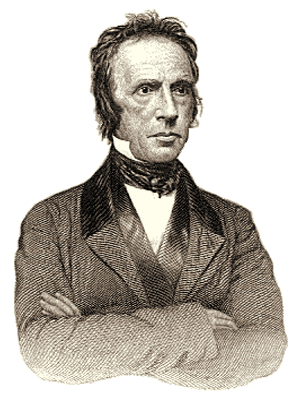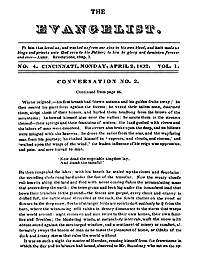
READINGS IN EARLY MORMON HISTORY
(Newspapers of Ohio)
Hamilton County, Ohio
The Evangelist
1832-1843 Articles

Walter Scott -- Restorer of the "Ancient Gospel"
|
Feb 05 '32 | Apr 01 '33 | Sep 02 '33 Oct 01 '38 | Dec 01 '38 | Jul 01 '39 Sep 01 '40 | Jan 01 '41 | Feb 01 '41 Mar 01 '41 | May 01 '41 | Jul 01 '41 Feb 01 '42 | Sep 01 '43 |

|
Articles Index | Christian Baptist and Millennial Harbinger
 To him that loved us, & washed us from our sins in his own blood, & hath made us kings and priests unto God, even to his Father; to him be glory and dominion forever and ever. - Amen, - Rev., Chap. 1. Vol. I. Cincinnati, Monday, February 5, 1832. No. 2.
Extract of a Circular Letter, BELOVED BRETHREN -- The Christian of the 19th century has been permitted to witness the accomplishment of wonderful events; Providence has stationed him on a sublime eminence, from which he can behold the fulfilment of illustrious prophecies, and look backwards upon nearly the whole train of events leading to the Millennium. |
 To him that loved us, & washed us from our sins in his own blood, & hath made us kings and priests unto God, even to his Father; to him be glory and dominion forever and ever. - Amen, - Rev., Chap. 1. Vol. II Cincinnati, April 1, 1833. No. 4.
RESTORATION OF THE ANCIENT GOSPEL.
Sir, |
 To him that loved us, & washed us from our sins in his own blood, & hath made us kings and priests unto God, even to his Father; to him be glory and dominion forever and ever. - Amen, - Rev., Chap. 1. Vol. II Cincinnati, September 2, 1833. No. 9. The inhabitants of Jackson county, Missouri, have voted the following resolutions against the Mormonites: |
 NEW SERIES Vol. VI. Carthage, Ohio, October 1, 1838. No. 10. MORMONISM. The following letter was sent under date of 11th August, to one of the brethren in Ohio. Mr. Parish, the writer, is one of the 70 persons, who was appointed to the high priesthood by Messrs. Smith and Rigdon, and he had therefore a right to know something of the matter. This vile imposture, like an abominable tumor, is swelling and coming to a head again in the State of Missouri. The whole plot in Kirtland having come to nothing after flooding some parts of the country with their worthless bank notes, Joseph and Sidney to save their bacon have reached the holy land in Missouri, whither their devotees are resorting in vast numbers. Seventy wagons in one train it is reported, were lately seen on their way thither: |
 NEW SERIES VOLUME L. -- NUMBER XII. LETTER 5th. It may be asked us as a previous question -- Whether the true gospel required to be restored either in matter or form in 1827 -- Whether at that time a person equal not merely to the disentaglement of the great element of belief -- that "Jesus Christ is the Son of God," but also to the urging upon society attention to the saving nature of this oracle was wanted -- Whether a person with such just views of the original Gospel as should enable him in the confidence of true faith to receive converts to remission and the Holy Spirit, was needed -- Whether a man was needed to inculcate prompt obedience to the gospel, and to say to such of his audience as believed "Why tarry you? Arise and be baptized and wash away your sins, calling upon the name of the Lord" -- finally, Whether a person was wanted who, having gone this far, felt himself prepared to take the converts, and avowedly immerse them for remission and for the Holy Spirit? |
 NEW SERIES Vol. VII. Carthage, Ohio, July 1, 1839. No. 7. THE MORMON BIBLE. The Boston Recorder of last week contains the following singular development of the origin and history of the Mormon Bible. It accounts most satisfactorily for the existence of the book, a fact which heretofore it has been difficult to explain. It was difficult to imagine, how a work containing so many indications of being the production of a cultivated mind, should be connected with a knavery so impudent and a superstition so gross as that which must have characterized the founders of this pretended religious sect. The present narrative, which, independently of the attestations annexed, appears to be by no means improbable, was procured from the writer by the Rev. Mr. Stow, of Holliston, who remarks that he has "had occasion to come in contact with Mormonism in its grossest forms." It was communicated by him for publication in the Recorder. |
 NEW SERIES Vol. VIII. Carthage, Ohio, September 1, 1840. No. 9.
THE HARBINGER.
|
 NEW SERIES Vol. IX. Carthage, Ohio, January 1, 1841. No. 1. MORMON BIBLE -- No. I. The Book of Mormon. -- Translated by Joseph Smith Jr., third edition carefully revised by the translator. Nauvoo, Ill., printed by Robinson and Smith. Stereotyped by Shepard and Stearns, West 3rd St Cincinati, Ohio, 1840. |
 NEW SERIES Vol. IX. Carthage, Ohio, February 1, 1841. No. 2. MORMON BIBLE -- No. II. In the prophecies there are some seeming contradictions between predictions and their accomplishment. |
 NEW SERIES Vol. IX. Carthage, Ohio, March 1, 1841. No. 3. MORMON BIBLE -- No. III. We have had a visit of the Mormons. There came hither a few weeks ago, according to a previous appointment, a Mr. Lummerce, a preacher of this sect. The topic was the Millennium, of course; and we attended, with the rest of our good citizens. The views delivered were precisely those of Winchester, afterwards retailed in a contracted form by Elias Smith, |
 NEW SERIES
NEW SERIESVol. IX. Carthage, Ohio, May 1, 1841. No. 5. MORMON BIBLE -- No. IV. Carthage has had another visit from the Mormons. The fact that we touched their idol the Golden Bible, has excited the highest indignation of these deluded men. At a previous meeting it was announced that the speaker named Page would, on Wednesday evening, address the audience relative to certain papers on Mormonism published in the Evangelist. Wednesday evening came, and there was a full house. In the beginning of his speech Mr. Page observed, "If Mormonism be false how comes it to pass that so many of the Disciples, Reformers, or Christians, as they sometimes call themselves, embrace it?" He had baptized many of them, and Rigdon himself had been a Reformer. To this it was replied that the question touched in the Evangelist did not relate to conversion, but to the Book of Mormon. Satan had left heaven, and Judas the college of Apostles, but the apostacy of the Devil and Judas argued nothing against heaven or the holy apostles. They had gone to their own place it was said: and with equal propriety it might be said of Rigdon and others who had apostatized from the Bible -- they had gone to their own place and would make better Mormons than Christians. |
 NEW SERIES Vol. IX. Carthage, Ohio, June 1, 1841. No. 6. MORMON BIBLE -- No. V. The following respecting this imposition, is a document that will explain itself. It was written by brother Josiah Jones, formerly of Kirtland, the seat of Mormonism in Ohio, but now of Carthage, and a member of respectable standing in the church here. He was one of the faithful few belonging to the church of Kirtland, who refused to follow Rigdon when he made a surrender of himself and his flock to the Mormons. |
 NEW SERIES Vol. IX. Carthage, Ohio, July 1, 1841. No. 7.
MORMONS -- Extract of a letter dated from
"The excitement on both sides of the river against the mormons, is increasing very fast. The conduct of Jo. Smith and other leaders, is such as no community of white men can tolerate. It is the entire absence of all moral and religious principle, that renders them so obnoxious to the Gentiles, of all denominations, wherever they reside. |
 NEW SERIES Vol. X. Carthage, Ohio, February 1, 1842. No. 2. MORMONISM IN PITTSBURGH. PITTSBURGH. JAN. 18, 1841 [sic - 1842?]. |
 NEW SERIES Vol. ?. Carthage, Ohio, September 1843? No. ?. MORMONISM -- The Means by which it stole the True Gospel. It is well known that the Mormons preach the true gospel and plead for immediate obedience to it on the part of the hearers, as the advocates of original Christianity do. This was not on original measure of Mormonism; for, indeed, baptism for the remission of sins is a phrase not found in their book. A few of their leaders took it from Rigdon, at Euclid, on the Western Reserve, as may be learned from brother Jones' account of their first visit to Kirtland, published in a preceding volume of the Evangelist. Rigdon, we were perfectly aware, had possessed himself of our analysis of the gospel and the plea for obedience raised thereupon; but not, choosing to rely on my own recollection of the means by, and the times at, which they were imparted to him, we wrote to Mr. Bentley, who is his brother-in-law, for the necessary information. Mr. Bentley's letter shows not only whence he received his knowledge of the true gospel; but also that, coward that he was, he had not the independence necessary to preach it in his own vicinity after he had received it. Thus the knowledge of ordering and pleading the elements of the true gospel by that people, is seen to arise near the same time and from the same source as that of our own reformation. Mr. Bentley's letter is as follows: -- |
Back to top of this page.
Articles Home Page | Newspaper Articles Index | History Vault
Oliver's Bookshelf | Spalding Studies Library | Mormon Classics
last updated: Jan. 8, 2006